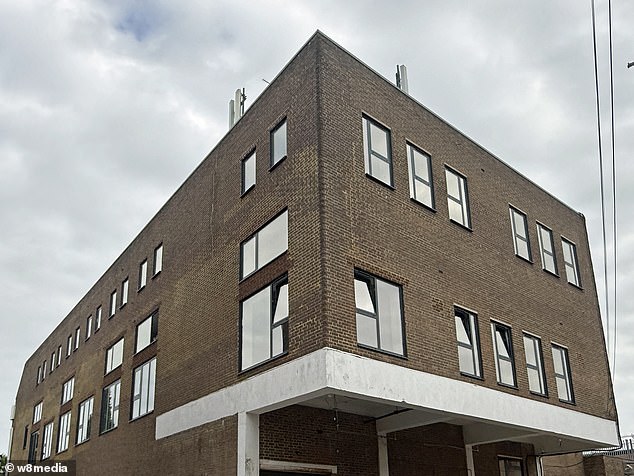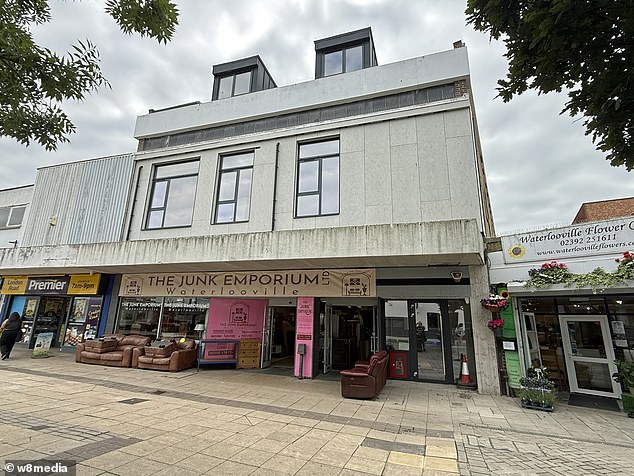Asylum seekers could be housed in empty homes, disused tower blocks and former student digs bought by local councils amid a growing backlash at the use of hotels.
The Government is proposing pilot schemes where it could pay local authorities to buy or renovate property, which they would lease back to the Home Office to house asylum seekers.
Chancellor Rachel Reeves has set out a target to end the use of hotels by 2029, although it is unclear how this can be achieved when Channel crossings are at record highs.
There are currently 700,000 empty homes across England, including 93,600 in London and 35,000 in Birmingham, Liverpool and Leeds – according to official figures.
Sir Keir Starmer outlined the Government’s approach this week, telling a committee of MPs: ‘A central focus of what we are doing is what can be built, arranged or taken by councils and repurposed. I am impatient for this change to be driven through.
‘We have to take over other accommodation, and we have to drive down the asylum lists. There is no alternative… There is lots of housing in many local authorities that can be used, and we are identifying where it can be used.’
Dame Angela Eagle, the border security and asylum minister, told MPs that the ambition was to move away from using private accommodation contractors to a ‘more democratically accountable’ system in partnership with councils.
Around 200 councils are said to have ‘expressed interest’ in running pilot schemes funded by central government.

The Home Office wants to relocate 35 asylum seekers to a brand new development in Waterlooville, Hampshire

Fresh clashes broke out outside The Bell Hotel in Epping on Sunday, despite a heavy police presence to separate rival groups of protesters
Migrant hotels are a major focus of public anger, with more protests taking place outside sites across England over the weekend.
The recent string of flare-ups began with a demonstration outside The Bell Hotel in Epping, Essex, after Ethiopian man Hadush Kebatu was charged with sexually assaulting a schoolgirl just days after he arrived in Britain in a Channel dinghy.
Police chiefs have already described the unrest at The Bell as a ‘signal flare’ for another summer of disorder.
Epping Council voted unanimously last week to urge the Government to close the hotel. But Treasury minister James Murray refused to comment yesterday when asked why the Government has not listened to the demands.
He told Sky News: ‘I’m not going to comment on specific cases, but I do understand people’s frustration.
‘And whilst, obviously, there can never be any place for criminal violence, there’s absolutely a right for people to protest about this.’
While using hotels at a cost of about £5.77million is unpopular, moving large groups of asylum seekers into accommodation in local communities often provokes a backlash too.
The Home Office sparked fury this week after it emerged they were planning, without consultation with the local council, to relocate 35 asylum seekers to a new development above a High Street shop in Waterlooville, Hampshire.

The earmarked development in Waterlooville is a newly converted block of 19 flats called Waterloo House

Patricia Walding, 87, was one of several locals concerned about the plans
The earmarked development is a newly converted block of 19 flats called Waterloo House.
The flats are located above a bric a brac store called The Junk Emporium which was once a Peacocks clothing store and before that, a Tesco.
It is owned by Mountley Group whose Director, Hersch Schneck, also owns a migrant hotel in nearby Cosham.
A member of staff at the shop, who rent from Mountley Group, told MailOnline how they only found out about the plans over Facebook and revealed the fallout of the row has severely impacted business.
She explained: ‘Yesterday we probably took around a third less. They [customers] think it’s to do with us but it’s not, we just rent the shop, they kind of assume we know what is going which we don’t.
‘We’ve had lots of phone calls and people coming in asking questions we can’t answer. We were always under the impression that the flats above would be sold to commuters and people like that.
Portsmouth fan Steve, 58, who has lived in the area his whole life, told MailOnline: ‘I’ve got a 13-year-old granddaughter, when you’re about that age, you want to go out up the high street, but I’d be worried now.
‘There’s no criminal history checks on these people. It’s easy to get swept up in that aspect, but it’s not just that, I think it will attract trouble for us as well as the migrants.
‘With the planned protests, I don’t want people to start smashing things up because that plays into the hands of the Home Office and police who say ‘see, there we go, right wing’.
‘We have genuine concerns but the narrative can change quickly.’
Patricia Walding, 87, added: ‘These hotels are changing our towns, they are costing us a fortune and robbing the taxpayer while our own people are sleeping on the streets, I think it’s disgusting.’
Sid Conroy, who used to work for Airbus and now spends his time breeding racing pigeons, fears serious repercussions if the hotel gets given the greenlight.
The 68-year-old said: ‘I’m dead against it, there could be fights and trouble up here. You’re going to have problems here, I can tell you that.
‘There are people waiting years on housing waiting lists and it just seems like they get a brand new flat just like that? Why can’t they look after us first?
‘Our government is making us unhappy because of it. People are left behind, they’re thinking more of the people coming in now. You get them coming over here, causing mayhem, causing trouble, all they get is a slap on the wrist and don’t do it again. This is how I see it.’
Others were more relaxed about the plans, with one lady, a special needs teacher who did not want to be named, claiming that locals were unloading unrelated grievances about their lives onto asylum seekers because they are ‘an easy target’.
On Friday, the Home Office said asylum seekers face being made homeless if they refuse orders by officials to move out of hotels into alternative accommodation.
Around 100 asylum seekers refuse to move accommodation each week, and ministers currently have no powers to force them.

Migrants are brought onshore at Dover after being picked up from a small boat yesterday

Record arrivals for the year is making it harder for officials to find new accomodation
Under the Conservatives, the Government threatened to remove housing and support from those who refused to move to the Bibby Stockholm barge, which is no longer in use.
Labour’s new plan will mirror the Tory rules, but will be applied more widely to other forms of accommodation.
The ‘firm but fair’ policy is part of the Government’s drive to end the use of expensive hotels to house asylum seekers.
One plan could see empty homes brought back into use to house both asylum seekers and local homeless people, according to the Telegraph.
A Home Office spokesperson said: ‘This government inherited an asylum system under immense strain and has acted decisively to restore control and reduce unsustainable costs, already delivering £500 million in savings.
‘We are reforming the asylum estate to reduce costs for taxpayers, having closed expensive large-scale sites – including Scampton, the Bibby Stockholm, and Northeye in Bexhill – and continuing to progress plans to end the use of hotels for asylum accommodation by 2029, while accelerating decision-making.’












